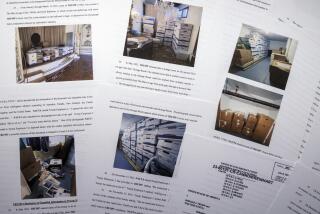Different Roster and Uniform, Similar Challenges
- Share via
When Cormac J. Carney was told he wasn’t good enough to play football, he just played harder. The guy who was called too short, too slight and too slow to make it in college ended up setting records at UCLA and playing a year of pro football.
The same lesson also applied to his legal career.
He ignored those who thought he was too young and inexperienced to succeed as a federal judge. Now he’s been a U.S. District Court judge in Santa Ana for two years and has bolstered his reputation with his handling of a large roster of complex cases. This month, Carney is set to handle the trial of two men accused of spying for the Chinese government.
His football career is decades past, and physically, the bespectacled Carney looks more bookish than brutish. But with his battered UCLA practice helmet displayed on a bookcase in his office next to a fist-sized rock he picked up on his 1987 honeymoon in Ireland, the lessons are far from forgotten.
“From a very, very early age, all I wanted to do was play football, but at every turn they said I just didn’t have what it takes,” Carney said. “My athletic experience really has helped me deal with courtroom pressure.”
Lawyers who have passed through his courtroom, even those who have been on the wrong side of his rulings, say Carney is painstakingly fair. Even off the record, none had an unkind word about the 46-year-old judge.
“He ruled against me, but I still think every judge should be like him,” said Roger Jon Diamond, who represented a Central Coast adult bookstore owner whom the city of Grover Beach sued over zoning violations.
Carney’s preparation for last summer’s hearing was meticulous, Diamond said. The judge made the eight-hour round trip to Grover Beach so he could assess the layout of the town and the possibilities for moving the bookstore.
“He’s probably the best judge I’ve appeared in front of in my life,” Diamond said.
Carney’s reputation as a high school football player didn’t carry those sorts of superlatives. No major college recruited him out of St. Anthony High in Long Beach, and he entered the Air Force Academy to see whether airplanes could be a substitute for the gridiron.
But when he tried out the pilot’s seat, motion sickness ruled out the possibility. Still, he succeeded at football, setting records as a freshman. His football success and the realization that he couldn’t be a pilot led him to transfer to UCLA.
Recruiting Carney, then-head coach Terry Donahue said, “was one of the better decisions in my career.” His former player’s legal success doesn’t surprise Donahue.
“All of the things he learned in football relate directly to what he’s doing now,” he said. “Both environments are demanding and call for discipline and commitment.”
Each of his three years at UCLA, Carney led the team in receiving. When he graduated in 1983, Carney was the Bruins’ all-time leading receiver, with 108 receptions for 1,909 yards. After the Bruins beat the University of Michigan in the 1983 Rose Bowl, many football publications projected that Carney would be selected in the first five rounds of the pro draft.
But the interest evaporated, and he went undrafted.
The New York Giants gave him a chance, but the team cut him after two preseason games. Undaunted, Carney joined the Memphis Showboats of the upstart United States Football League. He played for a year, leading the team in yards per reception, before his passion for the game receded.
“To be good at that position, you have to play with reckless abandon,” he said. “The older I got, I lost my competitive edge.”
Besides getting to travel and play against future Hall of Famers such as Steve Young, there was another benefit to Carney’s stint in the now-defunct USFL: His year with Memphis paid for almost two years of Harvard Law School.
At Harvard, Carney stood out more for his judicial ambition than his football career.
“It was the late ‘80s, and everyone wanted to work on Wall Street. It was all about making money,” said Mary Beth Carney, his wife and Harvard classmate. “Cormac was all about public service.”
Mary Beth started contributing to her husband’s career when they were in law school: She would type his papers. After she left her own successful career as a corporate lawyer to stay home with their three children -- now in sixth, eighth and 10th grades -- she continued to be a sounding board for his legal arguments. But she’d listen only during the spare time she had while dinner was cooking.
“He’d have to tell me what he was going to say in five minutes, so he really learned how to get to the point,” she said.
Carney spent 14 years as a business litigator.
Mary Beth said she never expected her husband to become a federal judge less than two years after Gov. Gray Davis appointed him to a Superior Court seat in Orange County in 2001. Donahue and former U.S. Secretary of State Warren Christopher, Carney’s legal mentor at the high-flying Los Angeles law firm O’Melveny and Myers, were the speakers at the judge’s swearing-in ceremony in 2003.
Tom Malcolm, an Irvine lawyer on the state Judicial Advisory Council, which screens federal judgeship applicants, said Carney’s age and relative inexperience were issues but not insurmountable ones.
“He is awfully young,” Malcolm said. “We overcame that because of his accomplishments. His work ethic is unsurpassed.”
The committee unanimously approved Carney’s appointment, Malcolm said, which is not typical for any appointee. Also not typical is Carney’s seeming lack of political leanings. He calls himself an independent and is registered “declined to state.” A Democratic governor nominated him for his first judgeship, and Republican President George W. Bush submitted his name for the federal seat.
“I would refer to him as apolitical,” Malcolm said.
In his first two years on the bench, Carney’s cases have run the gamut of the legal system.
He upheld a death penalty ruling against a man accused of killing a 12-year-old girl as she walked with a friend in the Cleveland National Forest in 1981, convicted men of smuggling women into the country and forcing them into prostitution, and handled a multimillion-dollar patent case.
“I knew this job would be interesting, but I really didn’t appreciate what high-stakes stuff I’d be dealing with week in and week out,” Carney said. “You get to see people’s greatest ideas and business strategies. You also see the worst in humanity.”
He doesn’t miss life as a lawyer, which he calls “a means to an end” of becoming a judge. The bravado and desire to be at center stage, which many of his colleagues exhibited, weren’t in his makeup.
“As lawyer, your focus is to win,” he said. “Your whole purpose as a judge is to do the right thing.”
More to Read
Go beyond the scoreboard
Get the latest on L.A.'s teams in the daily Sports Report newsletter.
You may occasionally receive promotional content from the Los Angeles Times.






